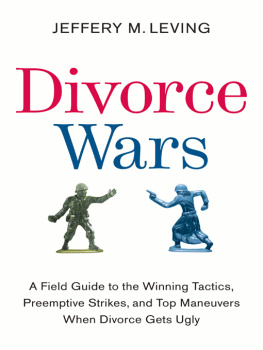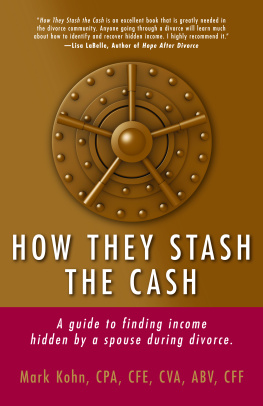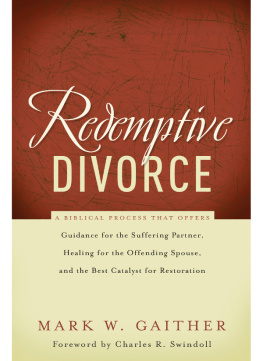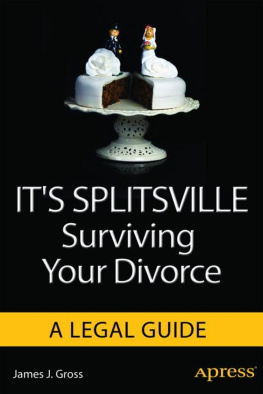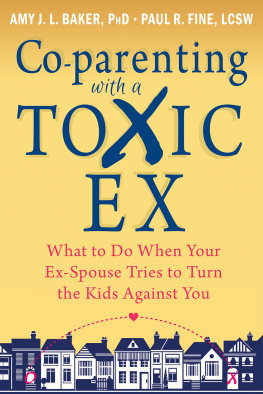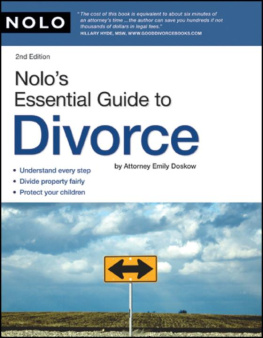JEFFERY M. LEVING
In loving memory of Penny.
I wish you could have had more time.
J. L.
I n my first book, written almost ten years ago, I emphasized in the introduction that you do not want to become involved in prolonged adversarial divorce litigation. Your life, your standard of living, and most important, your relationship with your children will almost certainly be damaged.
As bad as the situation was in 1997, it is even worse today. Having been a divorce lawyer for twenty-five years, I have seen my share of feuding couples, and even when I started out husbands and wives were at each others throats. In the last decade, though, things have changed. Divorce wars seem to break out at the slightest provocation. All it takes is for one spouse to make what the other considers an unreasonable demand, or bring the kids back a little late from visitation, or start going out with someone else, and all hell breaks loose. Sometimes, just filing for divorce is all thats needed to set off a fight. People who are ordinarily rational and controlled are temporarily transformed by the divorce process. They become vengeful, abusive, and money-crazed. They cant be in the same room with their spouse without getting in a shouting match and accusing the person of terrible things. Some people insist on an expensive divorce trial because they want to show the world what an awful person their spouse is; they are focused on spending as much money as they possess in order to humiliate their partner. These individuals may love their children, but have no compunction about using them to exact vengeance for the alleged wrongs done to them.
Certainly this type of thing went on before 1997, but it is much more common today, and the wars are more intense and longer-lasting. In a moment, Ill explain why divorcing ugly has become a trend rather than an occasional occurrence. First, though, let me share a story that will explain my motivation for writing this book.
DAN AND CONNIE
F rom the moment Dan came to my office seeking someone to handle his divorce, he was furious. Connie, his wife of 14 years, had taken out an ex parte order of protection against him, telling a judge that she feared he might harm her or her children. Under the terms of the ex parte order, Dan was not informed of Connies action in court nor was he given the opportunity to present a defense in court. Instead, when he returned to his house after work he discovered that the locks had been changed, his clothes and other belongings were piled up on the front porch, and a policeman was there to make sure he didnt enter the house.
As Dan explained to me, Connie had filed for divorce a few weeks ago, but they had agreed that for the sake of the childrenthey had two boys, ages five and ninethey would manage as best they could living under the same roof and he would not hire a lawyer. Dan had hoped they could patch things up and save the marriage. He admitted that he was in part responsible for their problems, since Connie had found out about an affair hed had with a work colleague. He insisted it was short-lived and all over with, and that it had been prompted by Connies growing disinterest in sex.
Dan was also incredulous that Connie was able to obtain an order of protection since he had no knowledge of the court date and there was no evidence of any abusehe said he had never struck Connie or the kids and had never threatened to do so. He had never been charged by Connie or anyone else with any crime, and the police had never been called to his house because of a domestic dispute. Nonetheless, the order of protection was in effect, and it prevented Dan from even seeing his children.
As the case unfolded, we learned that Connie had hired an attorney who was well known for using this tactic as a negotiating tool. This lawyer routinely counseled his clients to obtain an order of protection and agree to lift it only in exchange for certain divorce terms. Connies terms included sole custody, possession of the house, and sufficient maintenance that she would not have to rejoin the workforce until their younger child was in college.
As you might imagine, Dan became even angrier when he realized that his wife was using the order of protection to negotiate settlement terms. Stupidly, and against my explicit and repeated warnings, Dan drove over to the house, violating the order of protection, and began screaming (in front of his children) that he would prefer to have bulldozers level this place than let you have it. As soon as he left, Connie called her lawyer and the police, and Dan was arrested for violating the order. Though he only had to spend a day in jail before he was bailed out, the experience ratcheted up Dans fury to a new level. He told me that regardless of cost, he wanted to fight Connie on every issue: He wanted sole custody of the kids, he wanted to make sure she had to get a job, and he insisted that they sell the house. He was adamant on these pointsnot because this is what he wanted out of the divorce, but because it was what Connie didnt want to happen.
Eventually, we managed to get Connie to withdraw the order and try to negotiate a settlement. During this time, Dan was given visitation, and on his first visit with his children he realized that his five-year-old was afraid of him. Apparently, Connie had told the children that the order of protection was why their father had not seen them for a while, and the five-year-old had also witnessed Dans threat to level the house. Dan tried and succeeded in allaying his childs fears, but he was so resentful of Connies action that he began telling both his sons that their mother was responsible for the divorce and that he wanted to keep the family together, that Connie was impossible to live with, and that he felt bad leaving both of them in the hands of someone who isnt playing with a full deck.
Dan revealed to me that his trump card in the negotiation was his knowledge that Connie had been diagnosed with depression, and that when the children were little shed been hospitalized and placed under a suicide watch. After trying a number of antidepressants, one had finally worked, but every so often she stopped taking her medication and fell back into a depressed state. Dan said their kids knew nothing about this, and that his threat to tell them would force Connie to agree to what ever terms he proposed.
Fortunately, I was able to convince Dan not to carry out this threat or tell his kids about their mothers condition. Eventually we reached a settlement agreement, even though on more than one occasion the case threatened to blow up and go to trial.
I was horrified by the stunt that Connie and her attorney had pulled; the worst thing about it was that it had damaged Dans relationship with his children. I was equally upset, however, by Dans behaviorhe was vengeful and abusive to the point that he was willing to cause emotional harm to his kids in order to hurt his wife.
This wasnt an isolated case. In recent years, Ive represented both men and women who have said and done things that turned their divorces ugly. The cumulative result of these cases is this book. I want to make people aware of the divorce wars that are raging out of control and offer advice about how to prevent these wars, or at least manage them so they do as little damage as possible to both husband and wife, and especially to the children. As I think youll agree, this type of advice is needed now more than ever.
WHY PEOPLE ARE FIGHTING MAD

